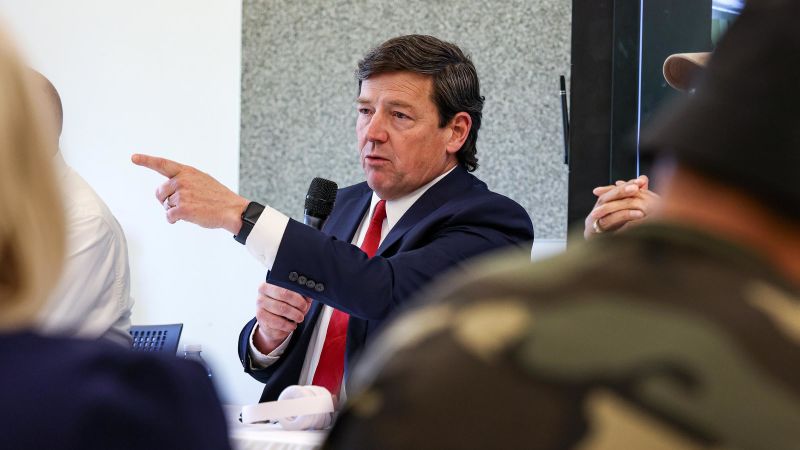The nomination of Ed Martin to serve as the U.S. Attorney for Washington, D.C., under the Trump administration is facing significant hurdles. President Donald Trump’s controversial nominee appears to be struggling to secure the necessary confirmations after encountering substantial public resistance from pivotal Republican figures in Congress. As more party members express their dissent toward Martin’s nomination, the prospects for confirmation are waning.
Senator Thom Tillis, a Republican from North Carolina and a crucial swing vote, has signaled his lack of support for Martin. This announcement, made on Monday, further complicates the nomination process. Tillis, who plays a pivotal role on the Senate Judiciary Committee—in charge of advancing nominees for full Senate votes—met with Martin earlier the same day, highlighting the weight of his dissent. Within the committee’s narrow margins, Tillis’ opposition could be detrimental to Martin’s chances of being confirmed.
Last week, Senator Tillis raised legitimate concerns regarding Martin’s earlier remarks that were disparaging towards the law enforcement officers who defended the Capitol during the infamous insurrection on January 6, 2021. In his commentary to CNN, Tillis remarked, “Most of my concerns are related to January 6, and he built a compelling case on some of the 15, 12 prosecutions that were probably heat of the moment bad decisions.” He went on to stress his belief that individuals who breached the Capitol’s perimeter should have faced imprisonment.
As Martin’s prospects for confirmation appear bleaker, a critical deadline looms. His name was notably absent from the agenda of the Senate Judiciary Committee meeting scheduled for this Thursday. This absence raises concerns that he might not be confirmed before his interim tenure expires on May 20. Senate Judiciary Chairman Chuck Grassley remarked on the committee proceedings, indicating his preference to act on nominations he believes could benefit the president’s agenda. Grassley maintained that his decisions were strategic and rooted in ensuring successful outcomes for nominees.
When questioned about Martin’s viability for committee approval, Grassley avoided making any definitive statements, emphasizing that his goal is to support nominees that could achieve success. This wavering commitment from committee leadership reflects the uncertainty surrounding Martin’s nomination. Additional reservations about Martin’s candidacy have emerged from Senators John Cornyn and Ted Cruz, with Cornyn indicating he would back Martin if the nomination reached the committee vote.
However, the announcement of Senator Tillis’s opposition seemingly sets off alarm bells. Senate Majority Leader John Thune suggested that Tillis’s stance might indicate Martin’s failure to advance beyond the committee stage. He mentioned the process that would follow if Martin could not clear the committee, highlighting the importance of this initial phase in the confirmation process.
Despite these challenges, the White House maintains a positive outlook regarding Martin’s nomination. Reports suggest that President Trump has personally reached out to Republican senators to rally support for his nominee. Furthermore, Trump’s team is actively consulting legislative advisors to strategize further actions regarding the confirmation.
White House spokesperson Alex Pfeiffer commended Martin, asserting, “Ed Martin is a fantastic U.S. Attorney for D.C. and will continue to implement the President’s law-and-order agenda in Washington.” In a display of confidence, Pfeiffer referenced President Trump’s sentiments regarding the necessity of Martin’s approval for safeguarding lives, suggesting an ongoing commitment to push through the nomination amidst adversities.
In summary, the nomination of Ed Martin as U.S. Attorney for D.C. has hit significant roadblocks, particularly with the opposition from Senator Thom Tillis and other GOP members signaling a tumultuous confirmation process ahead. As the deadline approaches, the dynamics within the Senate Judiciary Committee and the broader Republican stance will play a crucial role in determining Martin’s future in this pivotal legal position. The White House’s sustained efforts to rally support suggest a continuation of contention as they try to secure a crucial win for the Trump administration amidst growing criticism and party dissent.



